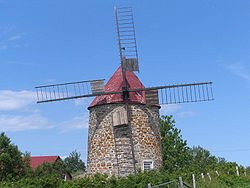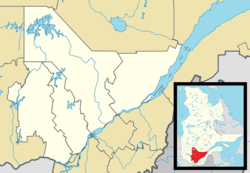Saint-Bernard-sur-Mer, Quebec
| L'Isle-aux-Coudres | |
|---|---|
| Municipality | |
 |
|
 Location within Charlevoix RCM |
|
| Location in central Quebec | |
| Coordinates: 47°24′N 70°23′W / 47.400°N 70.383°WCoordinates: 47°24′N 70°23′W / 47.400°N 70.383°W | |
| Country |
|
| Province |
|
| Region | Capitale-Nationale |
| RCM | Charlevoix |
| Settled | 1728 |
| Constituted | August 23, 2000 |
| Government | |
| • Mayor | Dominic Tremblay |
| • Federal riding | Montmorency—Charlevoix —Haute-Côte-Nord |
| • Prov. riding | Charlevoix–Côte-de-Beaupré |
| Area | |
| • Total | 97.10 km2 (37.49 sq mi) |
| • Land | 30.12 km2 (11.63 sq mi) |
| Population (2011) | |
| • Total | 1,279 |
| • Density | 42.5/km2 (110/sq mi) |
| • Pop 2006-2011 |
|
| • Dwellings | 760 |
| Time zone | EST (UTC−5) |
| • Summer (DST) | EDT (UTC−4) |
| Postal code(s) | G0A 3J0 |
| Area code(s) | 418 and 581 |
| Highways | No major routes |
| Website | www |
L'Isle-aux-Coudres is a municipality in Quebec, Canada, in the Charlevoix Regional County Municipality in the Charlevoix area of the Capitale-Nationale region. It is located on and contiguous with Coudres Island (Île aux Coudres), located in the St. Lawrence River about 6 kilometres (3.7 mi) south from the mainland.
The island was named by Jacques Cartier during his second expedition in 1535 for the many nut-bearing trees on the island. "Coudriers" is the archaic French word for Hazel tree. Whereas the modern French spelling for "island" is île, the municipality uses the old French spelling of Isle.
Its population centres include La Baleine in the north-east, (Saint-Louis-de-)l'Isle-aux-Coudres in the south, and Saint-Bernard-sur-Mer in the north-west facing Baie-Saint-Paul. A free ferry service connects Saint-Bernard-sur-Mer to Saint-Joseph-de-la-Rive on the north shore of the gulf.
Formerly, porpoise fishing was practiced on a broad basis, supplemented by some boat construction. Today tourism is the main industry, and the place is known for its historical sites, tourist accommodations, and craftspeople. On the beach near the ferry dock, there is a shipyard that is home to craftsmen who work according to ancestral techniques. The island is also a popular destination for cyclists.
It was the setting for the classic 1963 National Film Board of Canada documentary Pour la suite du monde.
The island is about 11 kilometres (6.8 mi) long and averages 3 kilometres (1.9 mi) in width. It is thought to have been formed from material lifted up by the impact of the meteor which formed the Charlevoix region. Local streams include the Rouge River and Mare Creek.
Étienne de Lessart of Ste. Anne-de-Beaupré was granted title as the first Seigneur of l'Isle-aux-Coudres by Governor Buade de Frontenac on March 4, 1677. Due to a failure to develop the property to increase its value he was forced to sell the seigneurie on October 19, 1687 to the Séminaire de Québec who began to establish a monastery on the site.
...
Wikipedia

